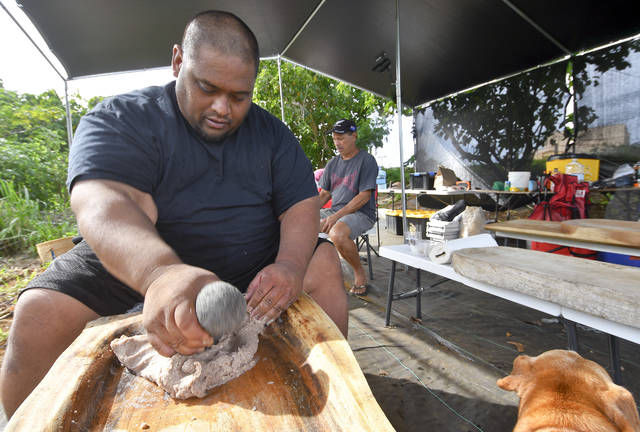PUHI — Kauai Community College is a center for Hawaiian learning. But just across from the One Stop Center lies a tent with beach chairs, poi boards and poi pounders.
It’s the ultimate course in Hawaiian studies that isn’t taught in a classroom.
It’s instructor, Joshua Fukino, is a 37-year-old Hawaiian man from Waimea. He is setting up his poi boards like he does every Tuesday afternoon, regardless if anyone else shows up to participate.
“I just feel like keeping it going,” he said. “I like to eat kalo every week, so I can see myself doing it every week. If I can, I leave it open for everyone to come.”
With assistance from his apprentice and two-year-old son, Kualau Rossi-Fukino, Fukino isn’t just using a pohaku (sacred Hawaiian stone) to pound poi to eat, he’s also keeping Hawaiian tradition and culture alive.
When asked why he pounds poi every Tuesday with his family, Fukino shrugged and replied “It’s just being Hawaiian.”
“Just having that background, that connection with the aina and stuff. When I was younger, I used to fish and whatever. It’s a pride thing,” he said. “Going back to eating traditional foods is a way of getting back our independence, our sovereignty or whatever. If I can plant the kalo and get water for it, then I can grow the kalo and feed my family. I can really have no dependence on anything except that.”
Although Fukino admits that he still shops at grocery stores because of convenience, he feels like he is doing his part for his culture, which became his mission more than seven years ago.
In 2010, Fukino began studying and learning about kalo. An interest turned into a hobby and then into an apprenticeship under Jerry Konanui, a cultural practitioner who specializes in Hawaiian kalo varieties.
“I started to ku’i kalo (pound poi) more often through that, then I found that I really enjoyed how to do it,” he said. “It was a lot different from the regular poi that you get at the stores. Then I started sampling the other varieties and that’s kind of when I got really into doing it like this.”
At first, pounding poi was what Fukino did to put food on the table at home. Before long, Fukino was getting requests to put on demonstrations.
“The first time I got asked to do it was at a clubhouse in Kukui’ula for Koloa plantation days,” Fukino said. “And then I was just doing it for a month regularly because I just liked to do it, but then I found a connection with Kealia’s Farmers Market where they cook and clean Kalo.”
Working with Kealia Farmers, Fukino would pick up kalo on Mondays and then pound it on Tuesdays.
“I started doing it by myself, but then figured that I might as well open it up to people on campus — any of the students and the community,” he said.
Throughout the semester, KCC students would notice Fukino and his family from across the way and join in not just to make food, but to learn firsthand, rather than read about it in a textbook.
“A lot of older students get their kids from Kawaikini (Public Charter School) and Punana Leo (O’ Kauai). So they pick them up and stop over here and ku’i kalo,” he said.
Fukino began a workshop in February in collaboration with Kauai Historical Society and began to notice some students beginning to bring some friends from work along.
He said that students working part-time jobs would bring co-workers and managers along to pound poi.
“I thought it was kind of cool because businesses came and made this a team-building type of thing with employees,” Fukino said. “They work together and make food. What you make is your food. You eat that after. We usually have a grill after when we eat the kalo and have fellowship and talk story.”
While he understands that pounding kalo is a part of the past and present of Hawaiian culture, Fukino recognized that it has to become an integral part of the future: not just to keep tradition alive, but to be there for his son.
“For Hawaiians, kalo was the center of the meal. That was the main dish, and it’s healthy,” he said. “Everything else was just sides. We’re just trying to bring that back. But it’s also a health thing for me. I recently had a son, he’s going to be three so that’s putting things into perspective.”
The poi boards and pohaku are brought by Fukino and his family from home.
“If you can get one in each household and have people just doing it, we can keep that tradition alive in that sense,” he said. “It’s like how some Mexican families still grind their own tortillas, because they get that kind stuff. They get that thing to grind and smash ‘em up. If we get poi boards and stones into people’s houses, they’ll make poi more.”






